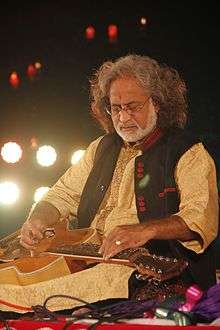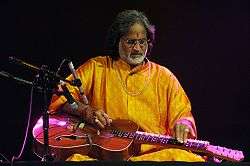Vishwa Mohan Bhatt
| Vishwa Mohan Bhatt | |
|---|---|
 Bhatt at Rajarani Music Festival, Bhubaneswar, Odisha | |
| Background information | |
| Also known as | V. M. Bhatt |
| Born | 27 July 1950 |
| Origin | Jaipur, Rajasthan, India |
| Genres | Indian classical music |
| Occupation(s) | Mohan Veena/slide guitar player |
| Instruments | Mohan Veena |
| Years active | 1965–present |
| Website |
www |
Vishwa Mohan Bhatt, also known as V. M. Bhatt (born 27 July 1950), is Grammy-winning Hindustani classical music instrumentalist who plays the Mohan veena (slide guitar).[1][2]
Personal life
Vishwa Mohan lives in Jaipur, Rajasthan, India, with his wife and two sons.[3] His elder son Salil Bhatt is a Mohan veena player (and also a player of the Satvik veena). Vishwa Mohan Bhatt's parents late Manmohan Bhatt and late Chandrakala Bhatt were also teaching and performing musicians who imparted knowledge of music to V.M Bhatt.[4] His nephew, Krishna Bhatt, plays the sitar and tabla.

Career
Vishwa Mohan Bhatt is best known for his Grammy award winning album A Meeting by the River with Ry Cooder released on Water Lily Acoustics label. He is also known for other fusion and pan-cultural collaborations with Western artists such as Taj Mahal, Béla Fleck and Jerry Douglas. Exposure such as an appearance on the 2004 Crossroads Guitar Festival, organized by Eric Clapton, allows his playing to reach a larger audience. Guitar duet release with Guitarist Kapil Srivastava (guitarmonk founder) [5] in the year 2016 for the composition "Merry Love Rain."[6]
Folk musician Harry Manx, who studied with Salil Bhatt for five years, plays a Mohan veena. Counting Crows' bassist Matt Malley also plays a Mohan veena and is a student and friend of Vishwa Mohan Bhatt. Australian musician Lawrie Minson also learned Mohan veena from Salil and Vishwa Mohan Bhatt.
Select discography
- 1992 - Guitar A La Hindustan, Magnasound (India)
- 1992 - Saradamani, Water Lily Acoustics
- 1993 - Gathering Rain Clouds, Water Lily Acoustics
- 1993 - A Meeting by the River (with Ry Cooder), Water Lily Acoustics
- 1995 - Bourbon & Rosewater (with Jerry Douglas & Edgar Meyer), Water Lily Acoustics
- 1995 - Mumtaz Mahal (with Taj Mahal & N. Ravikiran), Water Lily Acoustics
- 1996 - Saltanah (with Simon Shaheen), Water Lily Acoustics
- 1996 - Tabula Rasā (with Béla Fleck & Jie-Bing Chen), Water Lily Acoustics
- 1996 - Sounds of Strings, Music today, India
- 2002 - Indian Delta (with Sandeep Das), Sense World Music, U.K.
- 2008 - Mohan's Veena, Times Music, India
- 2010 - Desert Slide, Times Music, India
- 2010 - Mohan's Veena II, Times Music, India
- 2011 - Groove Caravan, Deeksha Records, Canada
- 2012- "Morning Mist", Bihaan Music, Kolkatta, India
- 2014 - OMKARA - The Sound of Divine Love (with Rupam Sarmah)[7]
- 2015-"Vishwa Ranjini"-Bihaan Music, Kolkatta, India
Awards
- 1993 Grammy Award (Best World Music Album) – A Meeting by the River(With Ry Cooder)[8]
- Sangeet Natak Akademi Award, 1998[9]
- Padma Shri, 2002 [10]
- Padma Bhushan, 2017[11]
References
- ↑ "Make the Mohan Veena, but Inform Us". Indian Express. 6 July 2006.
- ↑ "'String' Operation: Pt Vishwa Mohan Bhatt, father of Mohan Veena". Indian Express. 7 January 2009.
- ↑ Paachak, Piyush (13 November 2005). "My mother still teaches me music". The Tribune. Chandigarh, India.
- ↑ Ramanath, Renu (18 October 2005). "Reinventing tradition". The Hindu.
- ↑ "BroadwayWorld". BroadwayWorld. Retrieved 11 May 2016.
- ↑ "DailyNewsOnline". DailyNewsOnline. Retrieved 11 May 2016.
- ↑ "Omkara: The Sound of Divine Love". Omkara - The Sound of Divine Love. Rupam Sarmah.
- ↑ "Past Winners Search". Grammy.com. Retrieved 2013-12-15.
- ↑ "SNA: Awardees List". Sangeet Natak Akademi. Archived from the original on 25 July 2010. Retrieved 7 August 2009.
- ↑ "Year wise list of recipients (1954-2014)" (PDF). Ministry of Home Affairs. Archived from the original (PDF) on 15 November 2016. Retrieved 10 April 2015.
- ↑ http://pib.nic.in/newsite/PrintRelease.aspx?relid=157675
- "Unfortunately classical music audience is decreasing: Grammy award winner Pt Vishwa Mohan Bhatt". FacenFacts.
- "Grammy Award Winner Maestro Vishwa Mohan Bhatt Talks About His Early Upbringing and His Passion for Classical Music". India New England. October 2014.
- "Classical music for classes not masses: Pt Vishwa Mohan Bhatt". Business Standard. Press Trust of India. 31 October 2013.
- Taneja, Nikhil (27 February 2010). "Pt Vishwa Mohan Bhatt felicitated". Hindustan Times.
- David, Stephen (31 December 1996). "I treat all human beings equally, especially ladies: Vishwa Mohan Bhatt". India Today.
- "The Instrumental Artistry of Vishwa Mohan Bhatt". Stephen Grossman's Guitar Workshop.
- "Pandit Vishwa Mohan Bhatt of Panchtatva". Hybiz TV. Hyderabad, India.
- "Music for Peace and Love - Vishwa Mohan Bhatt on Sun 9th November 2014". Skiddle.
- "Pandit Vishwa Mohan Bhatt in Oxford". Asian Lite. Manchester, UK. 29 October 2014.
- Booth, Paul. "Music Mondays: Part 1 — Vishwa Mohan-Bhatt". Influx Magazine.
- "The Music of the Mohan Veena with Pandit Vishwa Mohan Bhatt". Berklee College of Music.
- "String theory: Taking Indian music to the world". Hindustan Times. 3 December 2014.
- Zacharias, Adam (22 January 2015). "Harmonic vibes come alive in the city". City Times.
- Arnold, Alison, ed. (2000). The Garland Encyclopedia of World Music: South Asia : the Indian subcontinent (Volume 5). New York: Garland Publishing. p. 466. ISBN 0-8240-4946-2.
- Qamar, Saadia (6 December 2010). "Tansen's legacy lives on". The Express Tribune.
- "Grammy award winner Pt. Vishwa Mohan Bhatt casts a spell". Atlanta Dunia.
- Nichol, Alan (5 November 2014). "Vishwa Mohan Bhatt plays Sage Gateshead this week in a rare UK performance". Chronicle.
- "Pop is temporary, classical music is permanent". Rediff.com.
- "Music: A Magical Mix of Indian Traditional, Canadian Blues, and American Roots". Rock, Paper, Scissors.
- Rajan, Anjana (13 July 2012). "Generations at play!". The Hindu.
Further reading
- Hunt, Ken (Oct. 1994) "A straight Bhatt ... the Grammy-winning, Cooder-collaborating inventor of the Mohan Vina" Folk Roots, Oct. 1994; pp. 42–45
External links
| Wikimedia Commons has media related to Vishwa Mohan Bhatt. |